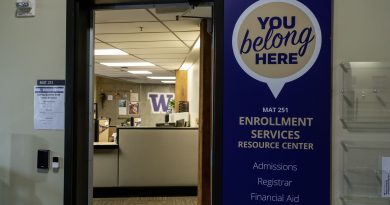LGBTQIA+ community demands action after bar inspections and lewd conduct citations
The Washington State Liquor Board has responded to concerns made by Seattle’s LGBTQIA+ community in a statement that may indicate future changes in rulemaking efforts and legislation.
On Jan. 26 and 27 in Seattle, 10 bars and nightclubs were subjected to unannounced inspections by Seattle’s Joint Enforcement Team, resulting in two citations against two LGBTQIA+ liquor establishments for lewd conduct violations.
The establishments that were hit with citations for lewd conduct clothing violations were The Cuff Complex and Neighbours Nightclub. Another LGBTQIA+ establishment, The Eagle, was inspected following a complaint of servicing a minor.
“I think the biggest part is just the fear, especially with all of the political climate going on, such things like those raids are crossing a line that a lot of people are a little uncomfortable with,” said UWT student Lexy Luna.
As an openly bisexual woman involved in volunteerism for the Pride Festival, Luna sometimes visits the Mix, a Tacoma LGBTQIA+ bar known for its inclusivity and nightlife activities.
While the inspections by law enforcement occurred at non-LGBTQIA+ establishments too, the visits instilled fear and anger throughout Seattle’s queer community. Students from UWT who frequent LGBTQIA+ bars and nightclubs in Tacoma and Seattle also expressed concern.
The Washington State Liquor and Cannabis board recently announced a pause of their participation in JET, as well as a pause on lewd conduct enforcement until the board votes on a proposal by staff to open rulemaking to review, amend or repeal the lewd conduct regulations, according to a press release by the LCB.
“At Wednesday’s Board meeting and in many private conversations, we heard strong objections to our actions,” said Director Will Lukela, in a statement published in the press release. “The community also stressed the value of these clubs as a safe place for people who often face discrimination, threats, and violence. Message received.”
In a survey conducted by the Ledger which obtained five responses from members of the LGBTQIA+ community in the Seattle-Tacoma area, two respondents felt LGBTQIA+ bars were being subjected to targeted raids, while two respondents answered maybe and one answered no.
“Whenever you see a cop in a club like that your first instinct is to leave, no matter what,” said UWT student Hank Bauer. “It’s very much like a daunting presence; it takes away any fun that anyone’s having.”
Bauer frequents LGBTQIA+ bars and nightclubs in the Capitol Hill Seattle area as a bisexual man, where he said he has witnessed occasional fights and police presence. In July 2023, Bauer also witnessed police questioning patrons at Kremwerk in Seattle, which led to multiple people leaving the dance club before the night ended.
One anonymous survey respondent wrote to the Ledger, “certain aspects like freedom of expression and dress should not be regulated in the way that they are. We should get in line with California on this. Set the nipples free.”

The legislation, WAC 314-11-050, states that bars with licenses may not permit, encourage, or allow employees to be unclothed or expose any portion of the breast below the top of the areola or another private part of the body.
Bars can also be cited for lewd conduct based on the clothing violations of their patrons. The Cuff was cited for lewd conduct in June 2022 for a patron wearing a jockstrap.
In a social media statement posted on Jan. 29 by Dan Savage, a journalist and LGBTQIA+ activist, which was signed by Cuff Owner Joey Burgess and Eagle Owner Keith Christensen, the owners demanded a thorough investigation, accountability and protection for the rights and dignity of the patrons, whose images were taken during the inspections.
An excerpt from the statement reads, “historically, raids have been used to persecute marginalized communities in their spaces. These recent events not only compromise the community’s sense of safety but also threaten to reverse progress in improving relations between the LGBTQ+ community and law enforcement.”
When asked to share his opinion of the legislation’s inclusion of exposed areolas, Bauer said the law was ridiculous, discriminatory and homophobic, disguised as legislation that promotes safety in liquor establishments.
On June 28, 1969, police and inspectors raided the Stonewall Inn, a popular gay bar in New York City, where they interrogated the patrons. Several people, including cross-dressers, were detained, while a few people escaped police custody and at least two drag queens were arrested, according to the Library of Congress.
“The citations that came out of it were things that seem very much of a different era, and the kinds of things that have been used in the past to police queer spaces and to instill fear in queer populations,” said Associate Professor Dr. David Coon of Media Studies, of the School of Interdisciplinary Arts and Sciences division at UWT.
Oppressed by anti-LGBTQIA+ laws that deemed homosexuality a criminal offense, people sought out gay bars for a safe space for freedom of expression and dress. Throughout the next six days, labeled the Stonewall Uprising, LGBTQIA+ people and allies gathered to protest the raids outside of the Stonewall Inn, according to the Library of Congress.
Before the internet, in-person protests were the primary method to rise against injustices. Now, social media and online spaces play a significant role in the public’s expression of thoughts and feelings regarding the application of certain legislation by law enforcement.







